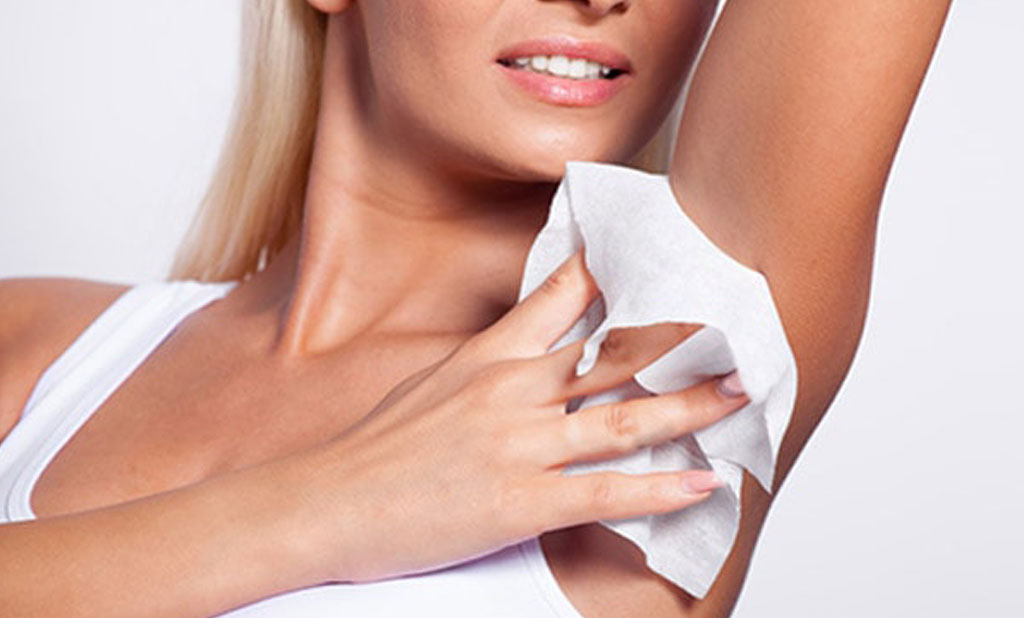What is quite normal during sports, exertion or a sauna session can be very unpleasant for those affected if it is omnipresent: we are talking about sweating. If someone produces excessive sweat and does so almost all the time, it could be hyperhidrosis. In this article, we will explain to you what this means exactly and how you can take action against it.
Why do we sweat?
When our body is challenged, it begins to sweat. As a result, it cools itself by allowing sweat to evaporate. In this way, heat is extracted from the skin and the blood vessels within it. Furthermore, sweat production fights harmful germs on the skin with the help of certain immunoglobulins and neutralizes their toxins. Sweating creates a special environment on the skin that strengthens the protective acid mantle. This inhibits the growth of microbes.
By the way, sweat consists of 99% odorless water. However, table salt, calcium and magnesium are also excreted with it. The fact that sweat begins to smell unpleasant is due to many metabolic products such as fatty acids, sex hormones or harmless microorganisms. They convert odorless substances into odoriferous substances.
Two to three million sweat glands are distributed over the skin, releasing between half a liter and a liter of sweat every day. Where they are particularly dense and numerous, we sweat the most. These are, for example, the soles of the feet, the palms of the hands, the elbows, the armpits or the forehead.
Dr. Tatjana Pavicic
Dr. Tatjana Pavicic is a specialist in dermatology and venereology with her own practice in Munich. She is an internationally recognized expert in aesthetic dermatology with a special focus on dermocosmetics, botulinum toxin, fillers and lasers.
Hyperhidrosis: massive sweating without a trigger
The number and density of sweat glands says nothing about their activity. This is because it is possible to tell whether the sweating process in the body is normal or disturbed.
The clinical picture of hyperhidrosis (from the ancient Greek hyper = too much; hidros = sweat) describes excessive sweat production, the purpose of which is no longer to fulfill the normal physical functions of sweating. It is a malfunction of the sweat glands, which produce too much secretion even when it is not necessary. Hyperhidrosis patients sweat profusely even though, for example, there are no elevated outside temperatures and no physical exertion is undertaken.
In affected individuals, sweat literally shoots out of the skin pores, leaving large, wet stains on clothing or footwear. Especially in the armpits, the sweat can come out very suddenly and trickle down the side of the body. Symptoms may be limited to individual areas of the body (e.g., palms, feet, armpits) or even occur all over the body.
In many cases, the cause of the disease cannot be determined. Then one speaks of idiopathic or primary hyperhidrosis. In this case, situations such as anxiety, pain or stress trigger the heavy sweating.
Occasionally, hyperhidrosis is the result of an underlying disease, e.g. hyperthyroidism, infectious disease, autoimmune disease, hormonal disorder, neurological or psychological disease, and hypertension. This is referred to as secondary hyperhidrosis.
If you suspect that you are suffering from hyperhidrosis, you should definitely have a medical examination to rule out more serious diseases.
HYPERHIDROSIS TREATMENT IN MUNICH
If an underlying disease has been ruled out, i.e. if it is idiopathic hyperhidrosis, Dr. Tatjana Pavicic can help you in her practice for dermatology and aesthetics with treatment approaches against the complaints: treatments with botulinum toxin or ultrasound (Ultherapy®) or Attiva are possible. We will decide together with you which treatment is right for you in a consultation.
If you have any questions, please do not hesitate to contact us.
Foto: © Adam Radosavljevic / ID:168454753 / fotolia.com

